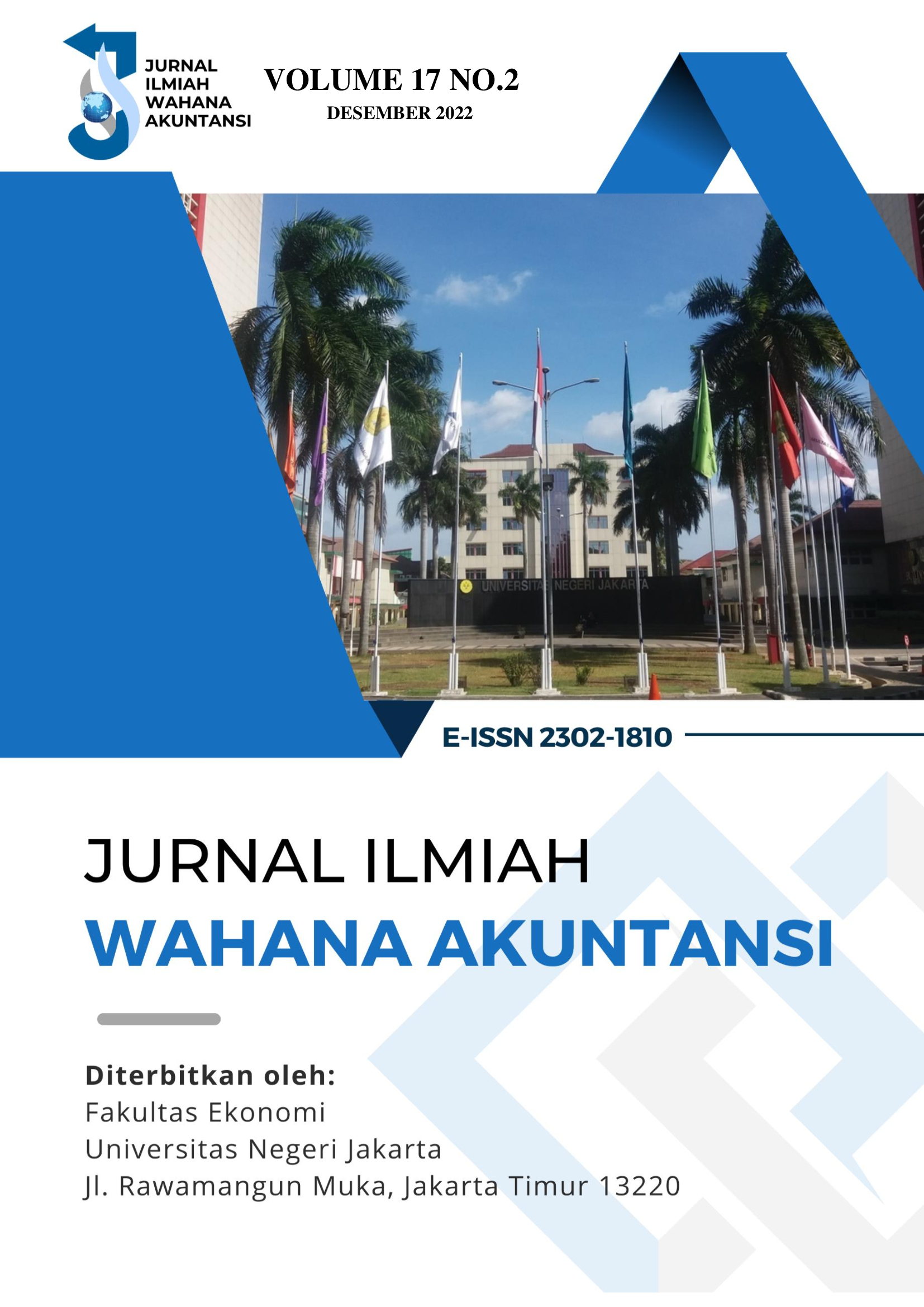Analisis Pengaruh Earning Power, dan Kepemilikan Manajerial Terhadap Manajemen Laba Dengan Keputusan Investasi Sebagai Variabel Moderasi
Sub Sektor Telekomunikasi yang Terdaftar di BEI Periode 2018-2021
DOI:
https://doi.org/10.21009/Wahana.17.025Abstrak
Tujuan dari penelitian adalah untuk memahami pengaruh earning power, kepemilikan manajerial terhadap manajemen laba, dengan keputusan investasi sebagai moderator. Perusahaan telekomunikasi yang terdaftar di Bursa Efek Indonesia antara 2018 dan 2021 menjadi sampel penelitian. Tujuh bisnis telekomunikasi dikumpulkan untuk sampel penelitian melalui penggunaan purposive sampling, dan sesuai kualifikasi yang diperlukan. Model yang digunakan yakni penelitian kuantitatif. Analisis yang dilakukan meliputi penggunaan statistik deskriptif, statistik inferensial dan pengujian hipotesis. Pengelolaan data untuk penelitian dilakukan dengan menggunakan software SmartPLS 3. Temuan penyelidikan mengungkapkan bahwa : (1) earning power berpengaruh negatif dan signifikan terhadap manajemen laba, (2) earning power berpengaruh negatif dan tidak signifikan terhadap keputusan investasi, (3) keputusan investasi berpengaruh negatif dan tidak signifikan terhadap manajemen laba. (4) Keputusan investasi tidak mampu memoderasi pengaruh earning power terhadap manajemen laba. (5) Keputusan investasi tidak mampu memoderasi pengaruh kepemilikan manajerial terhadap manajemen laba.
Referensi
Dwi Urip Wardoyo, Lathifah Ayu Rahmanissa, Y. R. P. (2022). Pengaruh Pertumbuhan Perusahaan, Leverage, dan Earning Power Terhadap Manajemen Laba. ulilalbabinstitute.com, 1(2), 69–78. http://ulilalbabinstitute.com/index.php/JIM/article/view/30
Fadly Bahrun, M., Tifah, T., & Firmansyah, A. (2020). Pengaruh Keputusan Pendanaan, Keputusan Investasi, Kebijakan Dividen, dan Arus Kas Bebas Terhadap Nilai Perusahaan. Jurnal Ilmiah Akuntansi Kesatuan, 8(3), 263–276. https://doi.org/10.37641/jiakes.v8i3.358Izazi
M., Afrizal, & Yustien, R. (2021). the Effect of Independent Commissioners, Managerial Ownership, Institutional Ownership, Audit Committee, Leverage and Compensation Bonus on Profit Management (on Mining Companies Listed on the Indonesia Stock Exchange , 2016-2019). Jambi Accounting Review (JAR), 2(3), 333–352.
Joseph Dimara, R. S., & Basuki Hadiprajitno, P. (2017). Leverage Terhadap Manajemen Laba. Diponegoro Journal of Accounting, 6, 1–11. http://ejournal-s1.undip.ac.id/index.php/accounting
Kristianti, D. (2016). Pengaruh Kualitas Audit, Ukuran Perusahaan, Leverage, Kepemilikan Institusional dan Kepemilikan Manajerial Terhadap Manajemen Laba. 1991, 1–23.
L. Mamu, Y. T., & Eka Damayanthi, I. G. A. (2018). Moderasi Kualitas Auditor Terhadap Pengaruh Leverage, Kepemilikan Manajerial, dan Kepemilikan Institusional pada Manajemen Laba. E-Jurnal Akuntansi, 25, 272. https://doi.org/10.24843/eja.2018.v25.i01.p11
Mariani, D., & Fajar, C. M. (2021). Pengaruh Earning Power Dan Leverage Terhadap Manajemen Laba Sub Sektor. Jurnal Financia, 2(1), 32–41.
Melda, S., Nadilla, T., Iskandar, Ramadhan, Ridha, A., & Puspita, D. (2020). Pengaruh Earning Power dan Perubahan Tarif Pajak Terhadap Manajemen Laba pada Perusahaan Perbankan yang telah Go Public di Bursa Efek Indonesia. Seminar Nasional Teknologi Komputer & Sains (SAINTEKS), 1983(7), 646–648. https://prosiding.seminar-id.com/index.php/sainteks
Mukhtar, N. (2010). Employee Stock Ownership Program Terhadap. 2(1), 1–21.Nugroho, S., & Darsono. (2015). Pengaruh kompensasi, kepemilikan manajerial, diversifikasi perusahaan dan ukuran kap terhadap manajemen laba. http://eprints.undip.ac.id/46188/
Purnama, Y. M., & Taufiq, E. (2021). Pengaruh Profitabilitas, Leverage, Firm Size, dan Earnings Power Terhadap Manajemen Laba pada Perusahaan Sektor Properti yang Terdaftar di Bursa Efek Indonesia Periode 2017-2019. Journal of Accounting, Finance, Taxation, and Auditing (JAFTA), 3(1), 71–94. https://doi.org/10.28932/jafta.v3i1.3280
Purnomo, B. S., & Pratiwi, P. (2001). Earning power. Panorama, 14, 20–23.
Puspitaningtyas, Z., & Puspita, Y. (2019). F. ISIP_Jurnal_Yeni Puspita U.Perusahaan Negatif. 24(1), 18–36.
Raka, R., &Suhartono, S. (2018). Kemampuan Kepemilikan Institusional Memoderasi Pengaruh Earning Power, Leverage, dan Ukuran Perusahaan Terhadap Manajemen Laba. Jurnal Bina Akuntansi, 5(2), 164–195. https://doi.org/10.52859/jba.v5i2.8
Rofiah, B. A. K., &Pujiono. (2022). Manajemen Laba Model Jones Dimodifikasi dan Arus Kas Operasi Terhadap Keputusan Investasi pada Sektor Aneka Industri di BEI setelah Implementasi IFRS. Fair Value: Jurnal Ilmiah Akuntansi dan Keuangan, 4(11), 5000–5007. https://doi.org/10.32670/fairvalue.v4i11.1798
Rokhaniyah, S. (2019). Pengaruh Manajemen Laba Terhadap Keputusan Investasi dengan Kompensasi Berbasis Ekuitas Sebagai Variabel Pemoderasi. 7(1), 59–73. https://doi.org/10.24964/ja.v7i1.705
Rosady, R. S. A., & Abidin, K. (2019). Pengaruh Kompensasi Bonus, Leverage, Ukuran Perusahaan, Earning Power Terhadap Manajemen Laba (Studi Empiris Pada Perusahaan Manufaktur Yang Terdaftar di Bursa Efek Indonesia Tahun. Liability, 2(2), 40–62.
Santana, D. K. W., & Wirakusuma, M. G. (2020). Pengaruh Perencanaan Pajak, Kepemilikan Manajerial Dan Ukuran Perusahaan Terhadap Praktik Manajemen Laba. Jurnal Ekobis : Ekonomi Bisnis & Manajemen, 8(2), 102–116. https://doi.org/10.37932/j.e.v8i2.40
Taco, C., & Ilat, V. (2016). Pengaruh Earning Power, Komisaris Independen, Dewan Direksi, Komite Audit dan Ukuran Perusahaan Terhadap Manajemen Laba pada Perusahaan Manufaktur yang Terdaftar di Bursa Efek Indonesia. Jurnal Emba: Jurnal Riset Ekonomi, Manajemen, Bisnis dan Akuntansi, 4(4), 873–884.
Utami, A., Azizah, S. N., Fitriati, A., & Pratama, B. C. (2021). Pengaruh Kepemilikan Manajerial, Kepemilikan Institusional, Kepemilikan Publik, Dewan Komisaris, dan Komite Audit Terhadap Manajemen Laba. RATIO: Reviu Akuntansi Kontemporer Indonesia, 2(2), 63–72.
Wardhani, T. S., Chandrarin, G., & Rahman, A. F. (2017). Pengaruh Kepemilikan Institusional Terhadap Nilai Perusahaan dengan Keputusan Investasi, Keputusan Pendanaan dan Kebijakan Dividen sebagai Variabel Moderasi. Jurnal Ilmu Akuntansi Keuangan dan Pajak, 1(2), 93–110.
Unduhan
Diterbitkan
Cara Mengutip
Terbitan
Bagian
Lisensi

Jurnal Ilmiah Wahana Akuntansi is licensed under a Creative Commons Attribution-NonCommercial-ShareAlike 4.0 International License.
Articles in Jurnal Ilmiah Wahana Akuntansi are Open Access articles published under the Creative Commons CC BY-NC-SA License. This license permits use, distribution and reproduction in any medium for non-commercial purposes only, provided the original work and source is properly cited. Any derivative of the original must be distributed under the same license as the original.











